Joel Ross’ Good Vibes headlined the final night of Hudson Jazz Festival with a 90 minute set of adventurous jazz that passed the vibe check both literally and figuratively.
Ross, a first-class vibraphonist who grew up in Chicago, has been a NYC resident for the past decade. A veteran sideman and leader at 30 years old, Ross is too established at this point to be called up-and-coming. In-demand and “the vibraphonist of his generation” might be better monikers for Ross, a Blue Note recording artist who is as much a staple in the jazz festival circuit as he is in the nightclub scene.
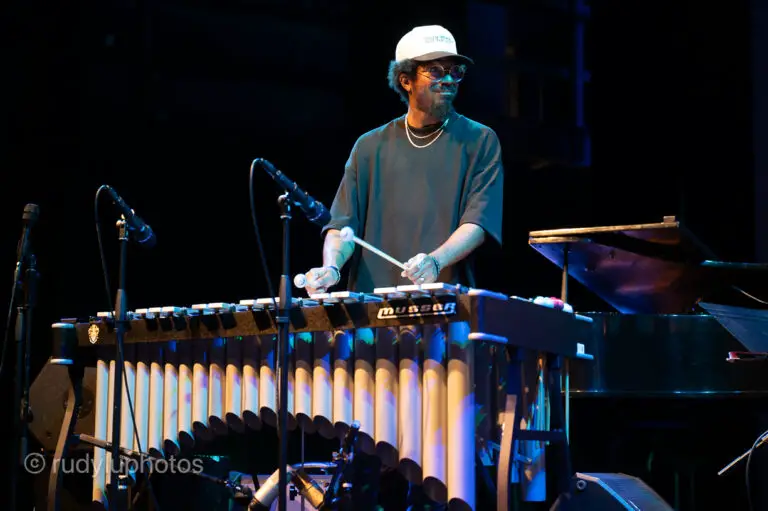
Sunday’s festival finale set at Hudson Hall was an early bird show for a band accustomed to late night jams. Ross, sporting a new haircut, black Nikes, and a matching baggy tee, took the stage at 5:15 pm (so early, that my photographer, who thought the show was at a more reasonable seven, almost missed the entire set). Fitting then that, “early” off of 2024’s nublues (Blue Note) kicked things off with Ross’ atmospheric, ringing vibes.
Good Vibes, which sometimes boasts multiple horn players, brought a lean quartet incarnation upstate. The ensemble featured Ross with Micah Thomas on piano, Kanoa Mendenhall on bass, and Jeremy Dutton on drums. As a quartet, the group’s sound was exploratory, conversational, and percussive. The group was also a flexible one straddling several styles of jazz: post-bop, hard bop, free jazz, ECM contemplative, hip-hop inspired, and at times the group even veered into chamber music territory.
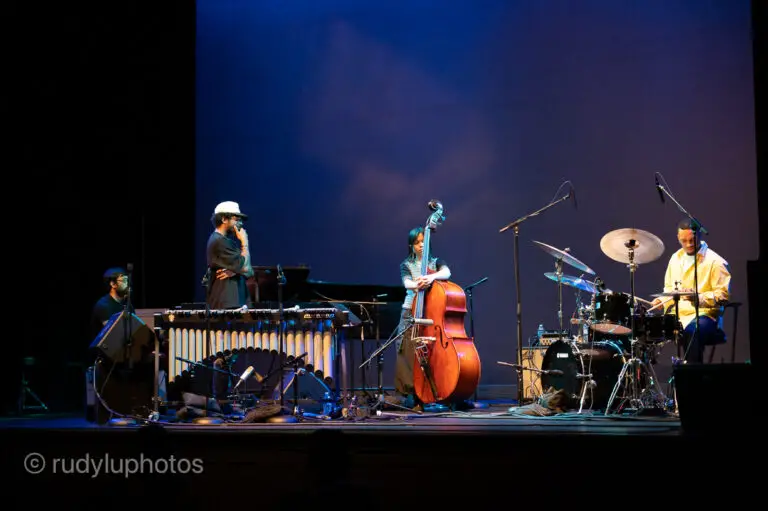
As comfortable playing standards as originals, highlights abounded in both categories. An early set gem was John Coltrane’s bluesy “Equinox”, which is quickly becoming a staple in Ross’ live shows. While I wouldn’t have minded a more stretched out version, I dig Ross’ late-night-NYC private eye take on the Coltrane classic. For his “Equinox” solos, Ross displayed a measured, swinging, and behind-the-beat style that also explored the upper-register sustain of his instrument. I was surprised I didn’t miss a sax solo, but Ross’ two-mallet approach was more than enough.
As a composer, Ross continues to show growth too, perhaps best illustrated by “bach (God the Father in Eternity)” in the latter part of the set. The bass and vibes engage in Bachian counterpoint, but the melody is pure gospel. At the core of Ross’ style is a democratic jazz that melds styles while simultaneously taking an ensemble approach to soloing. The result is unpredictable music with a spiritual and human center — always my preference over watching cold clinicians who can play a bunch of fast notes.
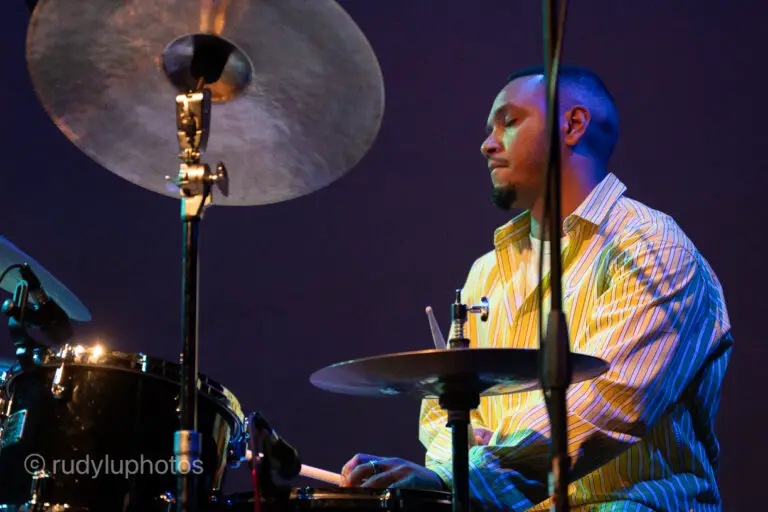
Ross’ bandmates more than held their own as well, particularly the nimble, muscular drummer Jeremy Dutton who seemed just as comfortable playing an Art Blakey press roll as he was channeling Makaya McCraven’s live hip-hop grooves. Dutton, though a bit loud at times, had technique galore, particularly in his mallet, brush, and avant-garde cymbal techniques.
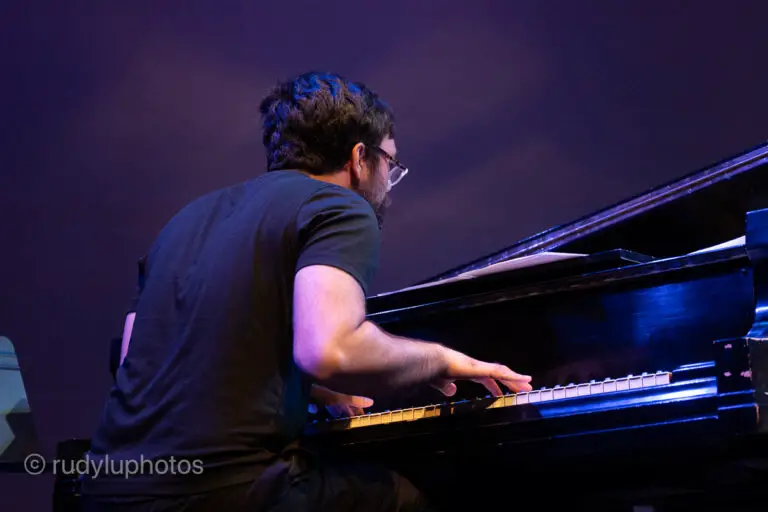
Kanoa Mendenhall’s bass provided the aforementioned counterpoint to Ross’ single note riffs, but she also demonstrated several fine bowed solos which added both chamber and out-jazz flavor to the improvisations. Pianist Micah Thomas was sometimes drowned out a bit by Dutton’s aggressive playing (granted I was on the drummer’s side of the stage), but when Dutton and Ross laid out, Thomas’ style revealed shades of Bill Evans’ harmonies with elements of a more angular, percussive approach.
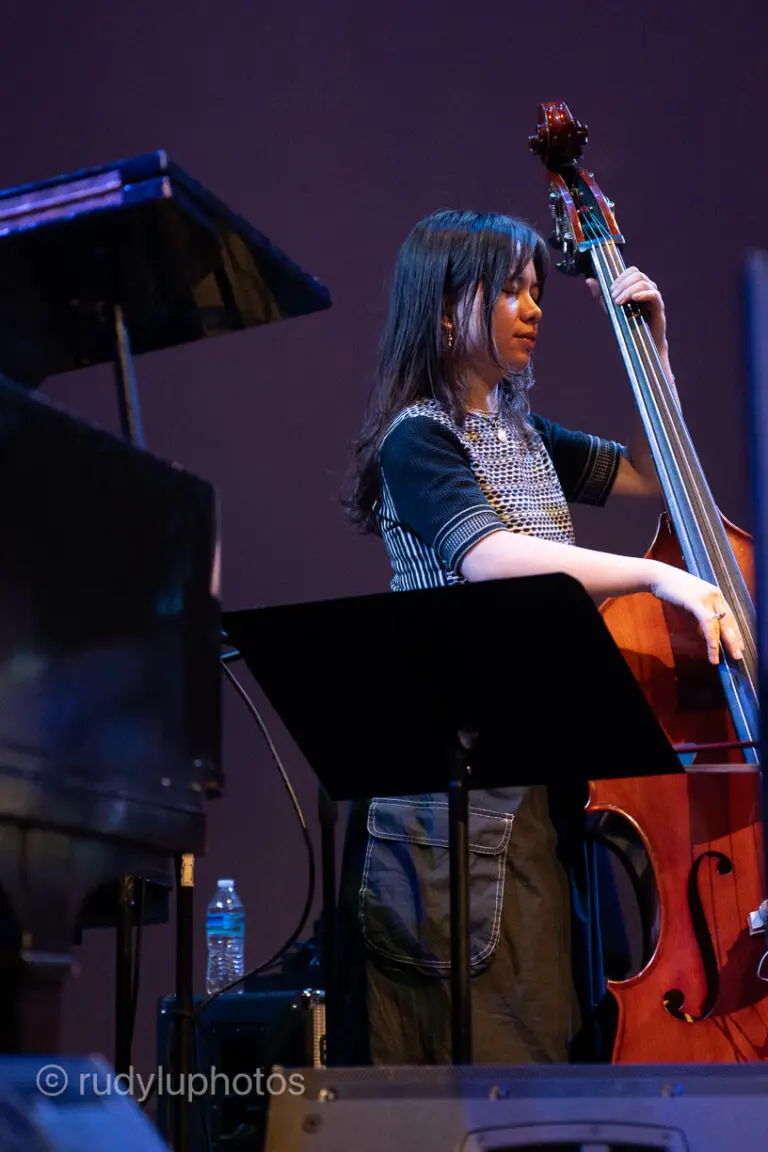
Ross was a quiet bandleader who let the music speak for itself, finally taking to the microphone thirty minutes into the set to introduce the band. His direction was sometimes as simple as a nod to Dutton or a whisper in the ear of Thomas. Ross would lay out at times, excusing himself to the perimeter of the stage, only to return to his vibes just in time to play the head or reel off a speedy arpeggiated ostinato. Some of Ross’ solo work was blisteringly fast and other moments felt like hypnotic loops that would make incredible basic tracks for hip hop artists. Here’s hoping Ghostface Killah or an MC of his ilk collabs with Ross in the near future.
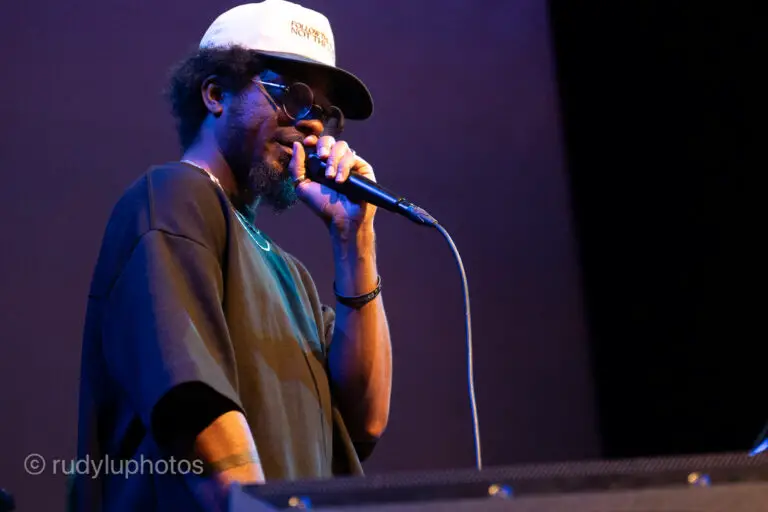
The Hudson Jazz Festival, hosted in Hudson, NY annually since 2018, is curated by arts advocate and creative producer Cat Henry. Henry is the former concerts and touring vice president for Jazz at Lincoln Center. Henry currently serves as the executive director of Live Music Society, a philanthropic foundation whose mission is to recognize and protect small music venues across the US.
Historic Hudson Hall, built in 1855, and restored in 2017, is a fine venue acoustically and aesthetically. The space was as charming as it was comfortable, and I hope to return next year to review the entire weekend of music. Sunday’s show was well attended, but not oversold, with many audience members volunteering that they had spent the whole weekend at the festival.
This year’s event included headlining sets on Friday by pianist Julius Rodriguez (who also appeared upstate at Saratoga Jazz Festival in June), and vocalist Caity Gyorgy on Saturday. Aside from the headliners, the weekend was also full of free “Sounds Around Town” pop up performances from local musicians and students and alumni from Bard College’s Jazz Program.
The Hudson Jazz festival is scheduled to return to the city (bringing its obligatory good vibes) on October 2-4, 2026.


Comments are closed.